If 条件句的用法1
- 格式:ppt
- 大小:701.00 KB
- 文档页数:28
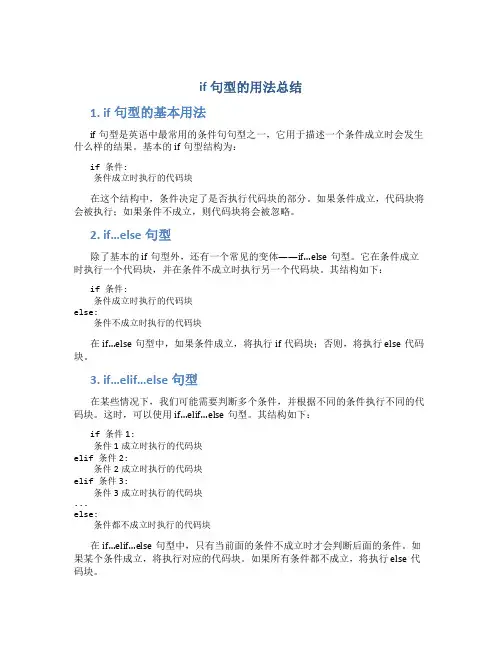
if句型的用法总结1. if句型的基本用法if句型是英语中最常用的条件句句型之一,它用于描述一个条件成立时会发生什么样的结果。
基本的if句型结构为:if 条件:条件成立时执行的代码块在这个结构中,条件决定了是否执行代码块的部分。
如果条件成立,代码块将会被执行;如果条件不成立,则代码块将会被忽略。
2. if…else句型除了基本的if句型外,还有一个常见的变体——if…else句型。
它在条件成立时执行一个代码块,并在条件不成立时执行另一个代码块。
其结构如下:if 条件:条件成立时执行的代码块else:条件不成立时执行的代码块在if…else句型中,如果条件成立,将执行if代码块;否则,将执行else代码块。
3. if…elif…else句型在某些情况下,我们可能需要判断多个条件,并根据不同的条件执行不同的代码块。
这时,可以使用if…elif…else句型。
其结构如下:if 条件1:条件1成立时执行的代码块elif 条件2:条件2成立时执行的代码块elif 条件3:条件3成立时执行的代码块...else:条件都不成立时执行的代码块在if…elif…else句型中,只有当前面的条件不成立时才会判断后面的条件。
如果某个条件成立,将执行对应的代码块。
如果所有条件都不成立,将执行else代码块。
4. 嵌套if语句在某些情况下,我们可能需要在if代码块中再次使用if语句,这就是嵌套if语句。
嵌套if语句可以用于处理更复杂的条件判断。
例如:if 条件1:if 条件2:条件1和条件2同时成立时执行的代码块else:条件1成立,但条件2不成立时执行的代码块else:条件1不成立时执行的代码块在嵌套if语句中,内部的if语句只有在外部if语句的条件成立时才会被执行。
5. if语句的注意事项•条件表达式:–条件表达式应该是一个布尔表达式,即可以判断为真或假的表达式。
–可以使用比较运算符(如==、!=、<、>等)、逻辑运算符(如and、or等)以及其他返回布尔值的函数或表达式作为条件。
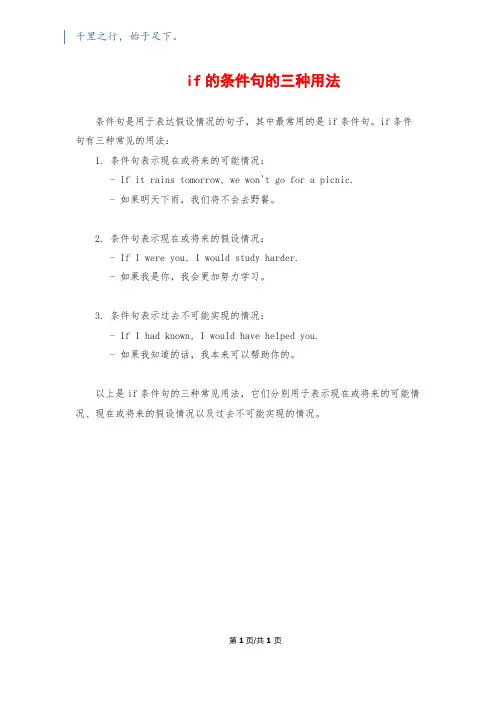
千里之行,始于足下。
if的条件句的三种用法
条件句是用于表达假设情况的句子,其中最常用的是if条件句。
if条件句有三种常见的用法:
1. 条件句表示现在或将来的可能情况:
- If it rains tomorrow, we won't go for a picnic.
- 如果明天下雨,我们将不会去野餐。
2. 条件句表示现在或将来的假设情况:
- If I were you, I would study harder.
- 如果我是你,我会更加努力学习。
3. 条件句表示过去不可能实现的情况:
- If I had known, I would have helped you.
- 如果我知道的话,我本来可以帮助你的。
以上是if条件句的三种常见用法,它们分别用于表示现在或将来的可能情况、现在或将来的假设情况以及过去不可能实现的情况。
第1页/共1页。
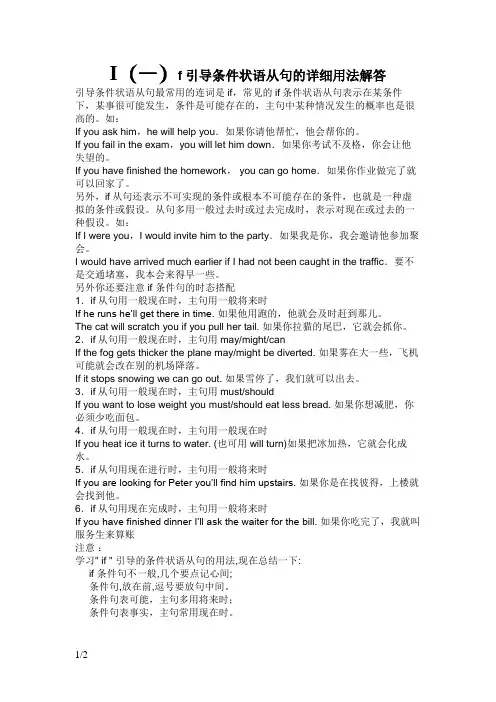
I(一)f引导条件状语从句的详细用法解答引导条件状语从句最常用的连词是if,常见的if条件状语从句表示在某条件下,某事很可能发生,条件是可能存在的,主句中某种情况发生的概率也是很高的。
如:If you ask him,he will help you.如果你请他帮忙,他会帮你的。
If you fail in the exam,you will let him down.如果你考试不及格,你会让他失望的。
If you have finished the homework, you can go home.如果你作业做完了就可以回家了。
另外,if从句还表示不可实现的条件或根本不可能存在的条件,也就是一种虚拟的条件或假设。
从句多用一般过去时或过去完成时,表示对现在或过去的一种假设。
如:If I were you,I would invite him to the party.如果我是你,我会邀请他参加聚会。
I would have arrived much earlier if I had not been caught in the traffic.要不是交通堵塞,我本会来得早一些。
另外你还要注意if 条件句的时态搭配1.if从句用一般现在时,主句用一般将来时If he runs he’ll get there in time. 如果他用跑的,他就会及时赶到那儿。
The cat will scratch you if you pull her tail. 如果你拉猫的尾巴,它就会抓你。
2.if从句用一般现在时,主句用may/might/canIf the fog gets thicker the plane may/might be diverted. 如果雾在大一些,飞机可能就会改在别的机场降落。
If it stops snowing we can go out. 如果雪停了,我们就可以出去。
3.if从句用一般现在时,主句用must/shouldIf you want to lose weight you must/should eat less bread. 如果你想减肥,你必须少吃面包。
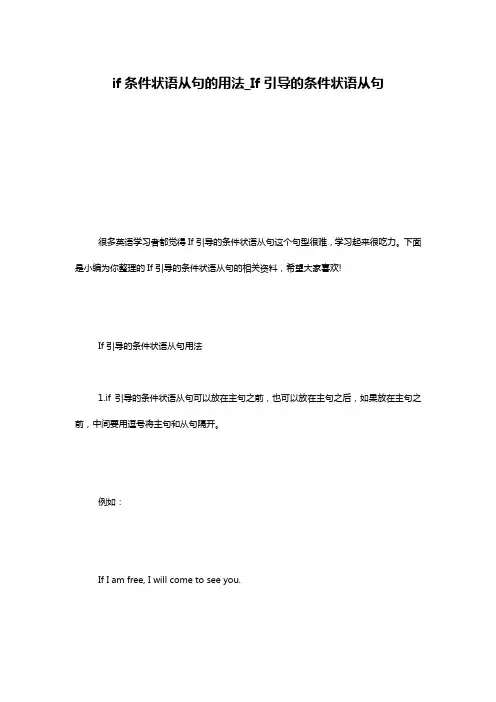
if条件状语从句的用法_If引导的条件状语从句很多英语学习者都觉得If引导的条件状语从句这个句型很难,学习起来很吃力。
下面是小编为你整理的If引导的条件状语从句的相关资料,希望大家喜欢!If引导的条件状语从句用法1.if引导的条件状语从句可以放在主句之前,也可以放在主句之后,如果放在主句之前,中间要用逗号将主句和从句隔开。
例如:If I am free, I will come to see you.= I will come to see you if I am free.如果我有空,我就来看你。
2. 在含if引导的条件状语从句的复合句中,主句用一般将来时,从句通常用一般现在时态表示将来意义,即主将从现原则。
例如:If it snows tomorrow, we will go skiing.如果明天下雪,我们就去滑雪。
3. 在含if引导的条件状语从句的复合句中,语句的谓语还可含有情态动词can、must、may等,主句也可是祈使句。
例如:If it stops raining, we can go out.如果雨停了,我们就能出去。
4. 在含if引导的条件状语从句的复合句中,如果主句部分描述的是客观事实或真理,要用一般现在时。
例如:If you heat the ice, it turns into water.如果你加热冰,它就会变成水。
if引导的非真实条件句对过去的虚拟条件从句(if):主语+had done 主句might/would/should/could+have done 对现在的虚拟if+ 主语+动词过去式(be用were)主句might/would/should/could+do对将来的虚拟if+主语+动词过去式(be用were)或主语+should do或主语+were to do主句might/would/should/could+doe.g.Tom got to the station in time because he started earlier.If Tom had started late, he would have missed the train.Do you think the thief entered through the door?No, if he had, I don't believe, he would have broken the living room window.If the book weren't so expensive, I would buy it.If you didn't live so far away, we would be able to visit you more.What would you do if you lost your passport in a foreign country?Why hasn't he come? If he should not come on time, we would have to put off the trip.2.注意事项e.g.If she hadn't work hard at English in the past, she wouldn't work as well as a secretary in a large company now. 混合时间的虚拟语气从句为对过去的虚拟,主句是现在。

if 的虚拟语气的用法在英语中,虚拟语气是一种表达假设、愿望、建议等非现实情况的语法结构。
其中,if 引导的虚拟条件句是最常见和重要的虚拟语气形式之一。
if 从句中使用了虚拟语气,而主句则会采用一个相应的情态动词来表示可能性、不可能性或者必然性。
本文将详细介绍 if 的虚拟语气用法,并以具体案例进行说明。
一、表示现在或未来的条件1. 表示对现在事实的怀疑:如果 if 引导的条件从句与现实相反,则主句常使用与过去时间相关的情态动词(could, would, might),尽管从句所描述的情况是目前存在或未来发生的。
例子:If I were rich, I would travel around the world. (I'm not rich now, and maybe I won't be in the future, but this is just a hypothetical situation.)2. 表示对将来事件的假设:如果 if 引导条件从句描述某种假设,主句通常会采用与未来相关的情态动词(will, shall)。
例子:If it rains tomorrow, we will stay at home. (We don't know if it will rain tomorrow or not, so this is just a hypothetical situation.)二、表示过去的条件1. 表示对过去情况的虚拟:如果 if 引导条件从句描述了过去某个时间的事实情况,但与事实相反,那么主句通常会使用与过去相关的情态动词(could have, would have, might have)。
例子:If she had studied harder, she could have passed the exam. (She didn't study hard enough, so she failed the exam. This is a hypothetical situation that didn't happen in reality.)2. 表示无法改变的过去情况:如果 if 引导条件从句表达了对以往事件的遗憾、怀念或不同寻常反事实假设,主句通常会使用与过去相关的情态动词(could/would/should/might + 过去完成时)。

i f条件状语从句的时态搭配It was last revised on January 2, 2021注意i f条件句的时态搭配1.if从句用一般现在时,主句用一般将来时If he runs,he’ll get there in time. 如果他跑,他就会及时赶到那儿。
The cat will scratch you if you pull her tail. 如果你拉猫的尾巴,它就会抓你。
2.if从句用一般现在时,主句用may/might/canIf the fog gets thicker ,the plane may/might be diverted. 如果雾在大一些,飞机可能就会改在别的机场降落。
If it stops snowing ,we can go out. 如果雪停了,我们就可以出去。
3.if从句用一般现在时,主句用must/shouldIf you want to lose weight ,you must/should eat less bread. 如果你想减肥,你必须少吃面包。
4.if从句用一般现在时,主句用一般现在时If you heat ice, it turns to water. (也可用will turn)如果把冰加热,它就会化成水。
5.if从句用现在进行时,主句用一般将来时If you are looking for Peter ,you’ll find him upstairs. 如果你是在找彼得,上楼就会找到他。
6.if从句用现在完成时,主句用一般将来时If you have finished dinner ,I’ll ask the waiter for the bill. 如果你吃完了,我就叫服务生来算账。
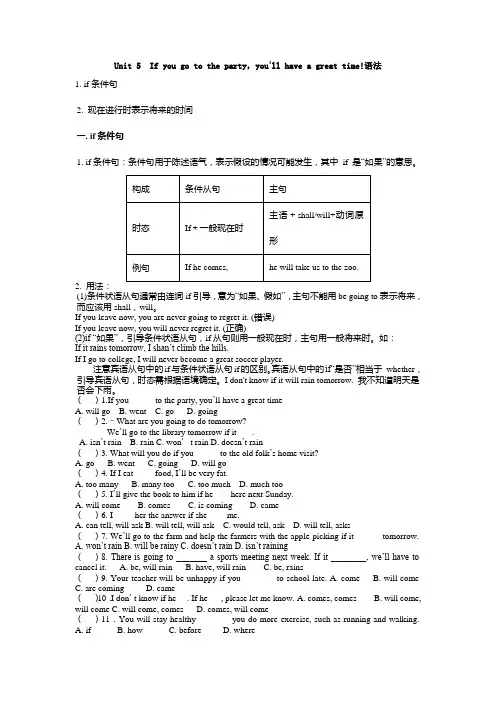
Unit 5 If you go to the party,you’ll have a great time!语法1. if条件句2. 现在进行时表示将来的时间一. if条件句1. if”的意思。
2. 用法:(1)条件状语从句通常由连词if引导,意为“如果、假如”,主句不能用be going to表示将来,而应该用shall,will。
If you leave now, you are never going to regret it. (错误)If you leave now, you will never regret it. (正确)(2)if “如果”,引导条件状语从句,if从句则用一般现在时,主句用一般将来时。
如:If it rains tomorrow, I shan’t climb the hills.If I go to college, I will never become a great soccer player.注意宾语从句中的if与条件状语从句if的区别。
宾语从句中的if“是否”相当于whether,引导宾语从句,时态需根据语境确定。
I don't know if it will rain tomorrow. 我不知道明天是否会下雨。
()1.If you _____ to the party, you’ll have a great timeA. will goB. wentC. goD. going()2.–What are you going to do tomorrow?--We’ll go to the library tomorrow if it ___.A. isn’t rainB. rainC. won’t rainD. doesn’t rain()3. What will you do if you _____ to the old folk’s home visit?A. goB. wentC. goingD. will go()4. If I eat ____ food, I’ll be very fat.A. too manyB. many tooC. too muchD. much too()5. I’ll give the book to him if he ___ here next Sunday.A. will comeB. comesC. is comingD. came()6. I ____ her the answer if she ____me.A. can tell, will askB. will tell, will askC. would tell, askD. will tell, asks()7. We’ll go to the farm and help the farmers with the apple-picking if it ____ tomorrow.A. won’t rainB. will be rainyC. doesn’t rainD. isn’t raining()8. There is going to _______ a sports meeting next week. If it ________, we’ll have to cancel it. A. be, will rain B. have, will rain C. be, rains()9. Your teacher will be unhappy if you _______ to school late. A. come B. will come C. are coming D. came()10.I don’t know if he __. If he __ , please let me know. A. comes, comes B. will come, will come C. will come, comes D. comes, will come()11.You will stay healthy _______ you do more exercise, such as running and walking.A. ifB. howC. beforeD. where()12.If she here tomorrow, I will tell you.A. comesB. will comeC. comeD. came()13. I’m waiting for my friend., I’ll go shopping alone.A. If she comesB. If she doesn’t comeC. If she won’t come()14. —Tom wants to know if you will have a picnic tomorrow.—Yes. But if it ______, we’ll play chess instead.A. will rainB. rainedC. is rainingD. rains()15. If Tom _____ the game, we'll give him a surprise". A. win B. wins C. won D. miming二. 现在进行时表示将来的时间1. 用be doing表示将来:主要意义是表示按计划、安排即将发生的动作,常用于位置转移的动词,如:go,come,leave,arrive等,也可用于其他动作动词,如:We are having fish for dinner. 我们晚饭吃鱼。
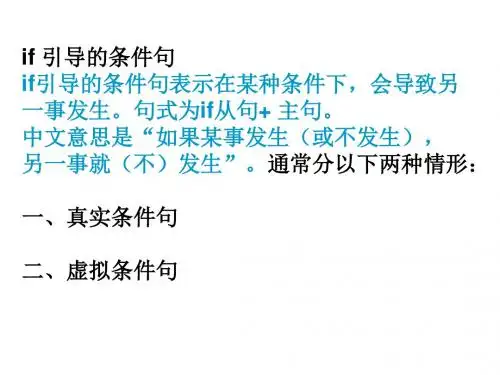
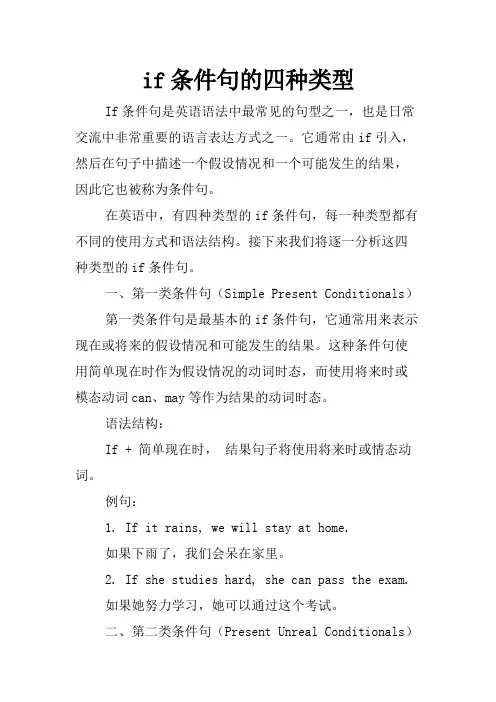
if条件句的四种类型If条件句是英语语法中最常见的句型之一,也是日常交流中非常重要的语言表达方式之一。
它通常由if引入,然后在句子中描述一个假设情况和一个可能发生的结果,因此它也被称为条件句。
在英语中,有四种类型的if条件句,每一种类型都有不同的使用方式和语法结构。
接下来我们将逐一分析这四种类型的if条件句。
一、第一类条件句(Simple Present Conditionals)第一类条件句是最基本的if条件句,它通常用来表示现在或将来的假设情况和可能发生的结果。
这种条件句使用简单现在时作为假设情况的动词时态,而使用将来时或模态动词can、may等作为结果的动词时态。
语法结构:If + 简单现在时,结果句子将使用将来时或情态动词。
例句:1. If it rains, we will stay at home.如果下雨了,我们会呆在家里。
2. If she studies hard, she can pass the exam.如果她努力学习,她可以通过这个考试。
二、第二类条件句(Present Unreal Conditionals)第二类条件句通常用于表示此时不可实现的假设情况和可能发生的结果。
它使用过去时态来描述假设的情况,而使用过去式的情态动词来描述可能发生的结果。
语法结构:If + 过去式, 过去完成时 (结果句子通常使用情态动词)例句:1. If I had a million dollars, I would buy a big house.如果我有一百万美元,我会买一个大房子。
2. If I were you, I would not go there.如果我是你,我不会去那儿的。
三、第三类条件句(Past Real Conditionals)第三类条件句用于描述过去真实发生的情况和相应的结果。
这种条件句使用过去式作为假设情况的动词时态,而使用过去完成式作为结果的动词时态。
语法结构:If + 过去时, 过去完成时例句:1. If she had studied harder, she would have passed the exam.如果她学习的更努力一些,她就可以通过这个考试了。
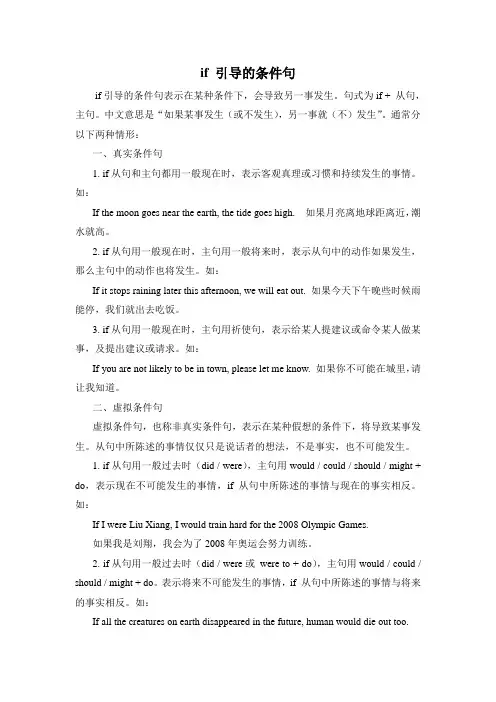
if 引导的条件句if引导的条件句表示在某种条件下,会导致另一事发生。
句式为if + 从句,主句。
中文意思是“如果某事发生(或不发生),另一事就(不)发生”。
通常分以下两种情形:一、真实条件句1. if从句和主句都用一般现在时,表示客观真理或习惯和持续发生的事情。
如:If the moon goes near the earth, the tide goes high. 如果月亮离地球距离近,潮水就高。
2. if从句用一般现在时,主句用一般将来时,表示从句中的动作如果发生,那么主句中的动作也将发生。
如:If it stops raining later this afternoon, we will eat out. 如果今天下午晚些时候雨能停,我们就出去吃饭。
3. if从句用一般现在时,主句用祈使句,表示给某人提建议或命令某人做某事,及提出建议或请求。
如:If you are not likely to be in town, please let me know. 如果你不可能在城里,请让我知道。
二、虚拟条件句虚拟条件句,也称非真实条件句,表示在某种假想的条件下,将导致某事发生。
从句中所陈述的事情仅仅只是说话者的想法,不是事实,也不可能发生。
1. if从句用一般过去时(did / were),主句用would / could / should / might + do,表示现在不可能发生的事情,if 从句中所陈述的事情与现在的事实相反。
如:If I were Liu Xiang, I would train hard for the 2008 Olympic Games.如果我是刘翔,我会为了2008年奥运会努力训练。
2. if从句用一般过去时(did / were或were to + do),主句用would / could / should / might + do。
表示将来不可能发生的事情,if 从句中所陈述的事情与将来的事实相反。
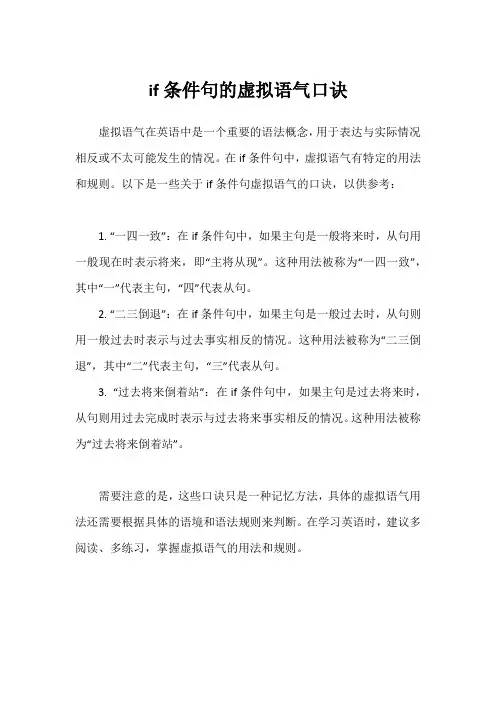
if条件句的虚拟语气口诀
虚拟语气在英语中是一个重要的语法概念,用于表达与实际情况相反或不太可能发生的情况。
在if条件句中,虚拟语气有特定的用法和规则。
以下是一些关于if条件句虚拟语气的口诀,以供参考:
1. “一四一致”:在if条件句中,如果主句是一般将来时,从句用一般现在时表示将来,即“主将从现”。
这种用法被称为“一四一致”,其中“一”代表主句,“四”代表从句。
2. “二三倒退”:在if条件句中,如果主句是一般过去时,从句则用一般过去时表示与过去事实相反的情况。
这种用法被称为“二三倒退”,其中“二”代表主句,“三”代表从句。
3. “过去将来倒着站”:在if条件句中,如果主句是过去将来时,从句则用过去完成时表示与过去将来事实相反的情况。
这种用法被称为“过去将来倒着站”。
需要注意的是,这些口诀只是一种记忆方法,具体的虚拟语气用法还需要根据具体的语境和语法规则来判断。
在学习英语时,建议多阅读、多练习,掌握虚拟语气的用法和规则。
千里之行,始于足下。
if从句的三种用法if从句是英语语法中常见的一个句子结构,用于表示假设、条件或可能性。
依据具体的语境和意义,if从句有三种常见的用法:条件句、假设句和虚拟语气句。
下面将具体介绍这三种用法。
一、条件句(Conditional Sentences)条件句用于表示某种条件下的结果或后果。
它由if引导,分为三种类型:零条件句、一般条件句和虚拟条件句。
1. 零条件句(Zero Conditional Sentences)零条件句表示事实真实的条件和结果,表示的是普遍真理或状况。
它的结构通常是:if + 现在时,现在时。
例如:- If you heat ice, it melts.(假如加热冰,它会溶化。
)- If it rains, the ground gets wet.(假如下雨,地面会变湿。
)2. 一般条件句(First Conditional Sentences)一般条件句表示可能发生的条件和结果,表示的是将来可能发生的状况。
它的结构通常是:if + 现在时,将来时。
例如:- If it rains, I will stay at home.(假如下雨,我会呆在家里。
)3. 虚拟条件句(Second Conditional Sentences)虚拟条件句表示不太可能实现的条件和结果,表示的是与现实相反的状况。
它的结构通常是:if + 过去时,would + 动词原形。
第1页/共3页锲而不舍,金石可镂。
例如:- If I had a lot of money, I would travel around the world.(假如我有很多钱,我会环游世界。
)二、假设句(Suppositional Sentences)假设句用于表示假设、猜想或非真实状况。
它由if引导,通常是对将来可能的状况进行推想或假设。
1. 假如假设是可能的(Possible Condition)这种状况下,if从句和主句中的动词形式一般都使用现在时。
注意if 条件句的时态搭配1.if从句用一般现在时,主句用一般将来时If he runs,he’ll get there in time. 如果他跑,他就会及时赶到那儿。
The cat will scratch you if you pull her tail. 如果你拉猫的尾巴,它就会抓你。
2.if从句用一般现在时,主句用may/might/canIf the fog gets thicker ,the plane may/might be diverted. 如果雾在大一些,飞机可能就会改在别的机场降落。
If it stops snowing ,we can go out. 如果雪停了,我们就可以出去。
3.if从句用一般现在时,主句用must/shouldIf you want to lose weight ,you must/should eat less bread. 如果你想减肥,你必须少吃面包。
4.if从句用一般现在时,主句用一般现在时If you heat ice, it turns to water. (也可用will turn)如果把冰加热,它就会化成水。
5.if从句用现在进行时,主句用一般将来时If you are looking for Peter ,you’ll find him upstairs. 如果你是在找彼得,上楼就会找到他。
6.if从句用现在完成时,主句用一般将来时If you have finished dinner ,I’ll ask the waiter for the bill. 如果你吃完了,我就叫服务生来算账(学习的目的是增长知识,提高能力,相信一分耕耘一分收获,努力就一定可以获得应有的回报)。
一、i f作为连词,引导条件状语从句,它表示的意思是“假如如果’’等。
在复合句中如果主句用将来时,则if引导的状语从句用一般现在时。
例如:1. If ltdoesn'tram, we will go to the park next Sunday.如果天不下雨,卜周星期天我们将去公园°2. If you ask him, he will help you.如果你求他,他将会帮助你。
二、i f还可以引导让步状语从句。
这时if当作“即使是”,“虽说“解。
例如:1. If she's poor, at least she's honest.虽说她很穷,但至少她还是诚实的。
2. If I am wrong, you are wrong, too.即使说我错了,那么你也不对。
3. Ill do it, even if it takes me all the afternoon•虽然会花费我一下午的时间»我还是要做这事。
三、i f作为连词还可以引导宾语从句。
引导宾语从句时和whether意思相同。
例如:1 ・ Lily asked if / whether she liked it.莉莉问她是否喜欢它。
2. She asked if / whether they had a cotton one.她问是否他们有一件棉织的。
四、i f引导时间状语从句,当if做“当“或'无论何时”解而不含有条件之义时,if从句中的时态与主句中的时态相同。
例如:1. If youmix yellow and blue> you get green.你将黄色与蓝色混合,便会得到绿色©2. If she wants the servant, she rings the bell.每当她需要仆人时,她便按铃。
五、i f后接否住动词,用于感叹句中,表示沮丧、惊奇等。
例如:1 ・ Well, if I haven't left my false teeth at home? X■倒霉» 我把假牙丢在家里了 !2. And if he didn*t try to knock me down!(What do you tliuik he did?He tried knock me down?)六、用于虚拟语气中川从句中用过去式,表示不可能实现,大概不会实现或提出作为考虑的假左条件。
if引导的条件状语从句if条件句:条件句用于陈述语气,表示假设的情况可能发生,其中if 是“构 成条件从句主 句时 态If+一般现在时主语+shall/will+动词原形例 句If he comes,he will take us to the zoo.1)用法:(1)条件状语从句通常由连词if引导,意为“如果、假如”,主句不能用be going to表示将来,而应该用shall,will。
If you leave now, you are never going to regret it. (错误) If you leave now, you will never regret it. (正确)(2)if “如果”,引导条件状语从句,主句用一般将来时,从句则用一般现在时,如: If it rains tomorrow, I shan’t climb the hills.(3)另外,主句是祈使句或含有情态动词,从句也用一般现在时。
如:Please call me if he comes next Sunday.Can you call the policeman if you are in the trouble.注意宾语从句中的if与条件状语从句if的区别。
宾语从句中的if“是否”相当于whether,引导宾语从句,时态需根据语境确定。
如果主句用一般现在时,从句可以根据具体情况选用时态,如果主句用一般过去时,从句必须用过去式的某种形式。
I don't know if it will rain tomorrow. 我不知道明天是否会下雨。
Our teacher said there was going to be a football match the next month.我们说下月将有场足球比赛。
【边学边做】用括号内所给词的正确形式填空。
1. What will you buy if you ________(have)a lot of money?2. If it ________(not snow)tomorrow, we will feel unhappy.3. You mustn’t go to school if you ________(be)still in bed.4. If he _______(be)at home at that time, he would know it.5. Please show me the way if you ________(know)it.6. You will hurt your teeth if you ________(eat)too much candy.7. If you gave me a toy car, I _________(be)very happy.8. I would get the prize if I _________(work)hard.9.If she ______ (finish ) work early ,she ______(go) home.10.If the weather______(be)fine,we_______(go)for a walk .11. If I_____(have) time tonight ,I _______(finish) the book I’m reading.12. If it ______(rain) next weekend , we_______(not be able to ) plant the vegetable .13. If it_______(rain),we______(stay) at home .14.If she______(arrive) ,she _____(phone) me .15. If he_____(call),tell him I’ll ring back .二、用所给词的适当形式填空1. If you ________(feel) tired, you _________ (have) to have a rest.2. Where _____ he ____(see) the film if he _________(have) time?3. If there ____ (be) fewer trees, there _______ (be) more pollution.4. He ___ (dress) more casually if he ___ (not work) on weekends.5. If Marcia _______ (live) alone, she _______ (keep) a pet parrot.6. Lana _____ (buy) a new dress if the old one ____ (be) out of style.7. The twins _______ (fight) if they__________ (argue).8. I ______ (have) a bake sale if I ____ (need) money for education.9. Peter ____ (send) me a beautiful souvenir if he ____(tour) Spain.10. If Mr. Green _______ (say) I am hard- working, my parents ___ (feel) glad.11. I ______ (go) to the beach if it________ (not rain) this week.12. _____they ___ (have) a match if the P.E. teacher __ (be) busy?13. He ____ (write) a letter to his grandparents if he ____ (get) his report card this week.14. If she ______ (get) up late, she _____ (not catch) the early bus.15. Peter ____ (major) in English if he ____(pass) the exams in PekingUniversity.二、完成句子1. 他如果看电视太久了,他的父母会不高兴。
if状语从句的用法1. if 引导的条件状语从句(真实条件句)用在if引导的条件状语从句中,表示在某种条件下很可能发生时,就是真实条件句,通常从句用一般现在时,主句用将来时态或者情态动词+动词原形或者祈使句的形式。
1 if从句用一般现在时,主句用一般将来时例If he runs he’ll get there in time. 如果他跑的话,他就会及时赶到那儿。
The cat will scratch you if you pull its tail. 如果你拉这只猫的尾巴,它就会抓你。
2 if从句用一般现在时,主句用may/might/can+动词原形例If the fog gets thicker the plane may/might be diverted. 如果雾再大一些,飞机可能就会改在别的机场降落。
If it stops snowing we can go out. 如果雪停了,我们就可以出去。
3 if从句用一般现在时,主句用must/should+动词原形例If you want to lose weight you must/should eat less bread. 如果你想减肥,就必须/应该少吃面包。
4 if从句用一般现在时,主句用一般现在时例If you heat ice it turns to water.(也可用will turn)如果你给冰加热,它就会化成水。
5 if从句用现在进行时,主句用一般将来时例If you are looking for Peter you’ll find him upstairs. 如果你是在找彼得,上楼就会找到他。
6 if从句用现在完成时,主句用一般将来时例If you have finished dinner I’ll ask the waiter for the bill. 如果你吃完了,我就叫服务生来结账。
2. If引导的条件状语从句(虚拟条件句)用表示的内容与现在事实相反,if从句用一般过去时,主句用“would/should/could/might+动词原形”;表示与过去事实相反,if从句用had+动词的过去分词,主句用would/should/could/might+have+动词的过去分词;表示对将来情况的主观推测,if从句用①should+动词原形②were to+动词原形,主句用would/should/could/might+动词原形。